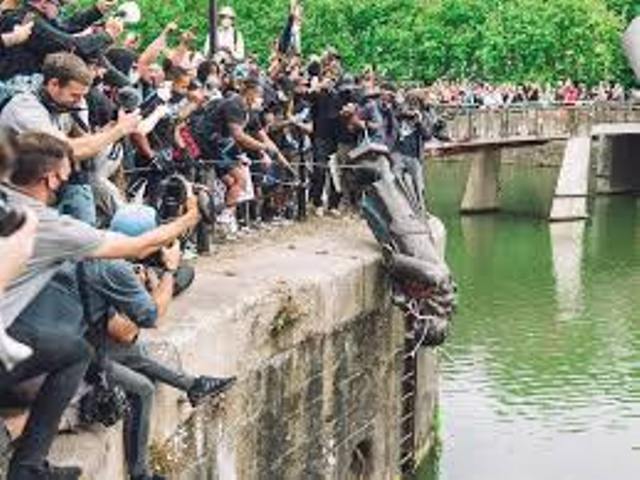 The statue of Edward Colston was pulled down by protesters in June 2020. [photo: Twitter]
The statue of Edward Colston was pulled down by protesters in June 2020. [photo: Twitter]
[This is an excerpt from an article which appeared in March in The Round Table: The Commonwealth Journal of International Affairs. Opinions expressed in articles do not reflect the position of the editorial board.]
A ‘culture war’ provoked in part by the toppling of a seventeenth century slave owner into Bristol Dock during a Black Lives Matter (BLM) demonstration has been embraced with enthusiasm by United Kingdom Cabinet Ministers.
First Robert Jenrick, Secretary of State for Housing, Communities and Local Government, announced in January that he would change the law to better protect statues, monuments and other memorials from ‘the flash mob, or by the decree of a “cultural committee” of town hall militants and woke worthies’.
A month or two later, Oliver Dowden, Secretary of State for Digital, Culture, Media and Sport, told the Policy Exchange UK think tank’s History Matters Conference this week: ‘Don’t allow yourself to be pushed around by the zeitgeist of the day. Take a longer-term view of things, make sure you do things in a rigorous way and understand that your principal duty is to preserve and conserve our heritage.’
Their interventions reflect the opinion of Edward Chancellor (The Round Table, Dec 2020). But I believe that he fails to appreciate the unresolved anger towards slavery that still exists in British society and instead launches an unjustified attack on ‘wokeness’ and cancel culture.
The slaughter associated with the Atlantic slave trade marks it down as one of the greatest genocides in human history and many of those actively supporting BLM can trace their ancestry directly to the survivors.
Although born in the city, [Edward] Colston left for London to attend school. The statue acknowledges his philanthropic activities in Bristol, funded in large part through his involvement in the Royal African Company which during his membership derived most of its wealth from slave trading.
Hostility to the statue is deep-seated in Bristol. In 2018, it was decided to change the statue’s plaque to refer to his slave-trading activities. A final wording was never agreed and the combination of frustration at the democratic process and the anger at the death of George Floyd made it an inevitable target.
Of course, criminal damage of any kind is to be condemned but it cannot be argued that public memorials should never be removed. The Colston example shows the consequences of a failure of public consultation. As Simukai Chigudu, associate professor of African politics at the University of Oxford, so eloquently expressed it: ‘We at least recognised that the statue of Rhodes did not actually exist in the past. It is not a sterile historical relic, or some accurate record of prior events. It is a piece of self-conscious propaganda designed to present an ennobled image of Rhodes for as long as it stands.’
Oriel College has resolved to transfer the Rhodes statue to a museum by the summer of 2021 but this is opposed by some academics.
Guilt by association permeates Chancellor’s article, with those who argue against the perpetual display of memorials condemned as simplistic and Manichaean, compared with iconoclasts and religious extremists who quote historical figures out of context.
But with statues it is the context that is missing. The paeon of praise on the inscription, delivered at the height of the imperialist era, remains out of the consciousness of the casual observer in our more nuanced world, while the darker truths, of Churchill’s disparaging views of the First Nations peoples of North America or First Australians, or Clive’s of the peoples of the India, are left to academics and scholars to dispute.
But for the black citizens of Bristol, the pervasiveness of Colston not only through the statue but the many buildings, roads and schools named after him is a daily reminder of the wealth their ancestors helped create through their labour. Chancellor, without offering evidence, says it is wrong to think that the continued public display of a statue signifies current approval for their actions and thoughts.
While the privileged may feel this way, the descendants of the objects of their prejudices and even violence feel otherwise. To ignore their views perpetuates the unhealthy divisions in our society that are exploited by extremists.
The solution? Civilised debate rather than diatribe.
David Jobbins is a former member of the Round Table Editorial Board.



